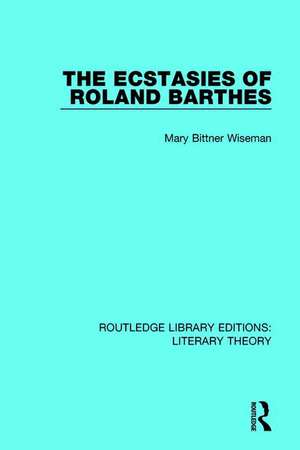The Ecstasies of Roland Barthes: Routledge Library Editions: Literary Theory
Autor Mary Bittner Wisemanen Limba Engleză Paperback – 9 ian 2018
| Toate formatele și edițiile | Preț | Express |
|---|---|---|
| Paperback (1) | 342.20 lei 6-8 săpt. | |
| Taylor & Francis – 9 ian 2018 | 342.20 lei 6-8 săpt. | |
| Hardback (1) | 999.46 lei 6-8 săpt. | |
| Taylor & Francis – 5 aug 2016 | 999.46 lei 6-8 săpt. |
Din seria Routledge Library Editions: Literary Theory
-
 Preț: 167.37 lei
Preț: 167.37 lei -
 Preț: 220.73 lei
Preț: 220.73 lei -
 Preț: 152.19 lei
Preț: 152.19 lei -
 Preț: 233.03 lei
Preț: 233.03 lei -
 Preț: 213.76 lei
Preț: 213.76 lei -
 Preț: 376.59 lei
Preț: 376.59 lei -
 Preț: 231.89 lei
Preț: 231.89 lei -
 Preț: 343.39 lei
Preț: 343.39 lei -
 Preț: 309.80 lei
Preț: 309.80 lei -
 Preț: 344.90 lei
Preț: 344.90 lei -
 Preț: 232.26 lei
Preț: 232.26 lei -
 Preț: 348.00 lei
Preț: 348.00 lei -
 Preț: 307.85 lei
Preț: 307.85 lei -
 Preț: 384.86 lei
Preț: 384.86 lei -
 Preț: 345.67 lei
Preț: 345.67 lei - 18%
 Preț: 1059.45 lei
Preț: 1059.45 lei -
 Preț: 223.80 lei
Preț: 223.80 lei -
 Preț: 233.78 lei
Preț: 233.78 lei -
 Preț: 115.88 lei
Preț: 115.88 lei -
 Preț: 342.63 lei
Preț: 342.63 lei -
 Preț: 376.96 lei
Preț: 376.96 lei - 34%
 Preț: 10311.60 lei
Preț: 10311.60 lei -
 Preț: 340.67 lei
Preț: 340.67 lei -
 Preț: 324.39 lei
Preț: 324.39 lei -
 Preț: 264.32 lei
Preț: 264.32 lei
Preț: 342.20 lei
Nou
Puncte Express: 513
Preț estimativ în valută:
65.49€ • 67.79$ • 55.35£
65.49€ • 67.79$ • 55.35£
Carte tipărită la comandă
Livrare economică 05-19 martie
Preluare comenzi: 021 569.72.76
Specificații
ISBN-13: 9781138684553
ISBN-10: 1138684554
Pagini: 220
Dimensiuni: 156 x 234 x 12 mm
Greutate: 0.12 kg
Ediția:1
Editura: Taylor & Francis
Colecția Routledge
Seria Routledge Library Editions: Literary Theory
Locul publicării:Oxford, United Kingdom
ISBN-10: 1138684554
Pagini: 220
Dimensiuni: 156 x 234 x 12 mm
Greutate: 0.12 kg
Ediția:1
Editura: Taylor & Francis
Colecția Routledge
Seria Routledge Library Editions: Literary Theory
Locul publicării:Oxford, United Kingdom
Public țintă
General, Postgraduate, and UndergraduateCuprins
Preface; Introduction; Part One; 1. I Refuse to Inherit 2. Certain Old and Lovely Things; Part Two; 3. To Silence the Flutes 4. Texts of Pleasure, Texts of Bliss 5. Identity Questions; Part Three; 6. Make-up, Masks, Cameras and Chromosomes 7. Magic, Not Art I 8. Magic, Not Art II; Coda; Bibliography; Index
Descriere
In this book, first published in 1989, Mary Bittner Wiseman interprets Roland Barthes’s experiments as efforts to reposition the human subject with respect to language and to time in order to let the subject escape from the language of a particular culture and the present time. With her insistent pushing against the boundaries of our standard academic assumptions, Mary Bittner Wiseman succeeds in interpreting Barthes’s effort to join the traditional and the new. This title will be of interest to students of literature and philosophy.
